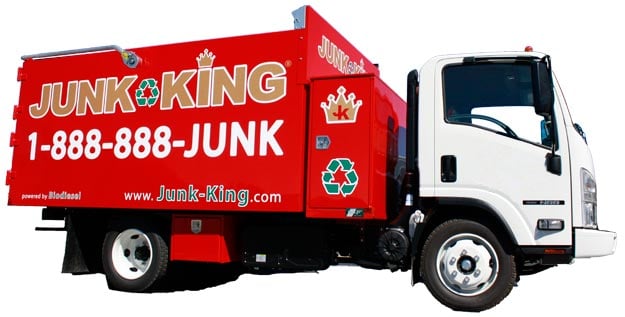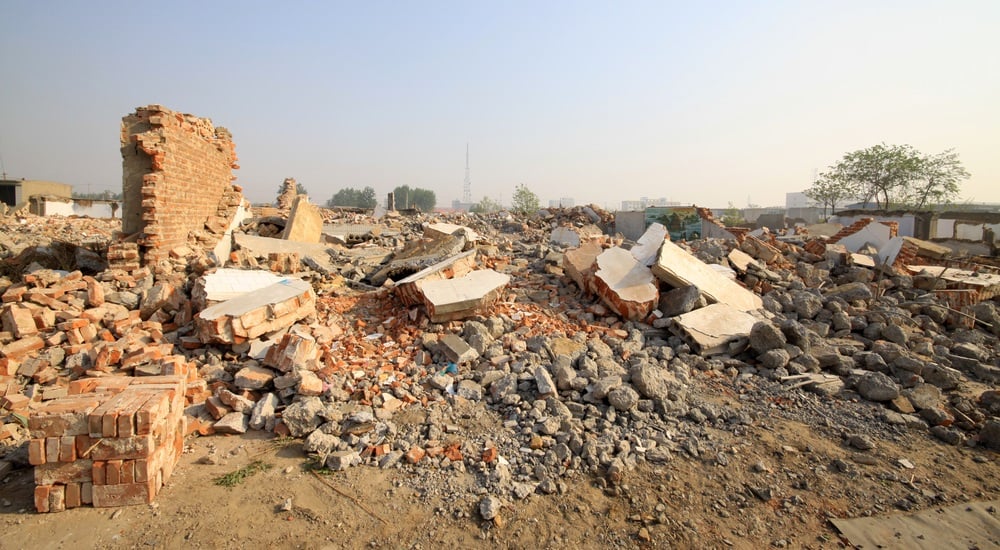
[This article was first published here in August 2021 and has been revised and updated.]
Any construction involving remodeling, renovation, or demolition often results in concrete rubble that can be a large part of construction waste disposal.
Unfortunately, this incredibly versatile and useful material often just ends up in a landfill, which is a two-fold loss for contractors and the industry.
Yes, you can probably clean up, remove, and dispose of your own construction site debris. And many contractors do. But many also simply haul their construction waste to the nearest landfill or waste transfer station.
Which means that most, if not all, of the material will not be recycled or reused.
And why is that important?
Simply because, according to available data, roughly 80 to 95 percent of all construction and demolition (C&D) waste can be recycled. That's right - almost all of it can be reused somehow.
According to a paper from CalRecycle,
Common C&D materials include lumber, drywall, metals, masonry (brick, concrete, etc.), carpet, plastic, pipe, rocks, dirt, paper, cardboard, or green waste related to land development. Many of these materials can be reused or recycled, thus prolonging our supply of natural resources and potentially saving money in the process. Of these, metals are the most commonly recycled material while lumber makes up the majority of debris that still goes to a landfill.
In fact, there are several models that can be utilized to optimize the reuse and recycling of all the various types of C&D waste that is generated from a site, while minimizing the amount of waste and debris that ends up in landfills.
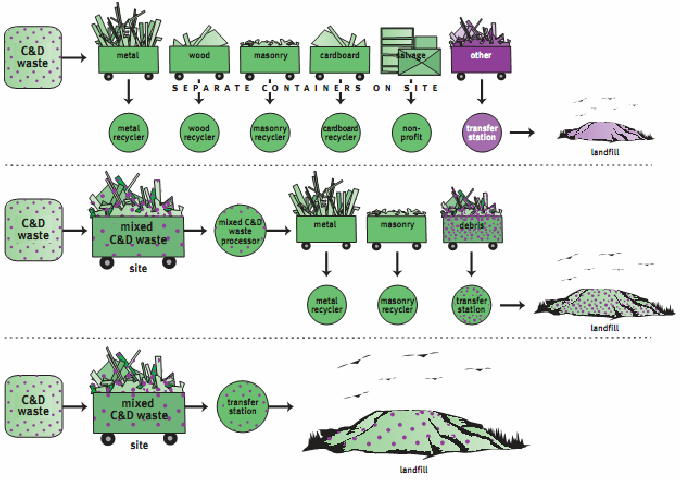 [Graphic courtesy of Tong T. Kien/ResearchGate]
[Graphic courtesy of Tong T. Kien/ResearchGate]
Employing techniques such as Deconstruction as opposed to demolition, for example, can go a long way towards minimizing debris destined for the dump. Not to mention providing useable materials for future construction.
And contractors who fully leverage deconstruction and reuse of building materials can generate some additional revenue from it, as well.
However, not every contractor or construction company has the time, personnel, and resources to fully take advantage of this approach.
Which is why Junk King specializes in construction waste disposal. We can help with that - even with concrete waste.
Recycle, Reuse, Repurpose - Giving New Life to Old Concrete
Handing this type of work over to a reliable third-party firm is a strategic approach for those who are managing job sites. And, aside from the economic, logistical, and efficiency benefits of outsourcing concrete waste disposal, there are the green benefits, as well.
An article in Wikipedia notes that recycling concrete rubble is a beneficial practice,
Concrete was once routinely trucked to landfills for disposal, but recycling has a number of benefits that have made it a more attractive option in this age of greater environmental awareness, more environmental laws, and the desire to keep construction costs down.
Recycling concrete recycling has a significant impact on the environment.
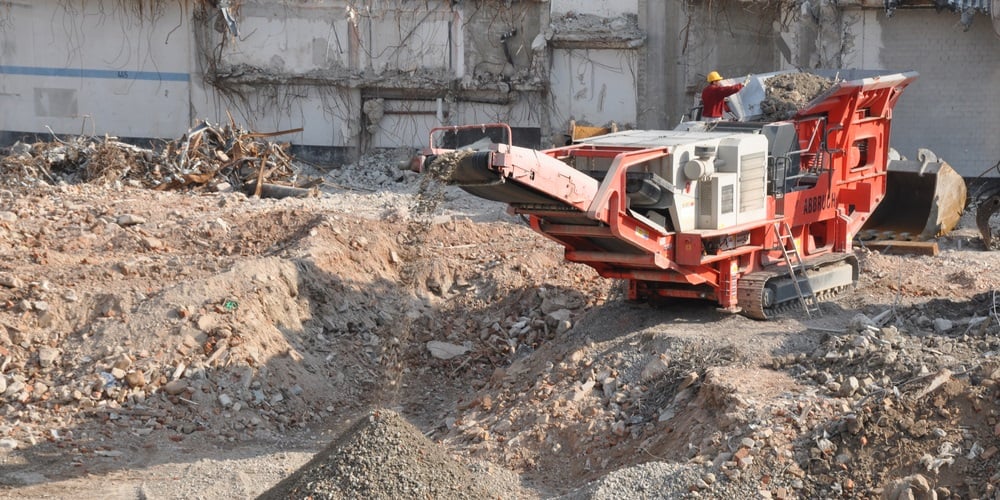
Not only that, it can help contractors and builders reduce new construction costs when properly executed and managed.
According to an article from The Balance/Small Business:
There is a range of environmental and economic benefits in recycling concrete rather than dumping it or burying it in a landfill. These advantages include:
-
-
Reduced tippage, or dumping fee, and related freight charges
-
Cheaper source of aggregate than newly mined
-
Reduction of landfill space required for concrete debris
-
Using recycled material as gravel reduces the need for gravel mining
-
Increasingly, high-grade aggregate for road construction is available only at greater distances, increasing the associated economic and environmental cost impacts associated with the longer haulage distances versus using recycled aggregate
Old concrete and other related materials salvaged from remodeling, renovation, and home improvement projects can find new and useful lives when they are diverted from landfills.
For example, after the tragic and devastating Tubbs Fire in Northern California in 2017, over 5,000 homes were totally destroyed. In most cases, all that remained of these structures were the concrete foundations.
These foundations were broken up, hauled off, and processed for reuse. The total volume of old concrete rubble weighed twice as much as the Golden Gate Bridge!
For the hauling operation alone, 775,000 tons was taken to recyclers or to landfill, and required up to 550 trucks per day and employed more than 1,000 people. While some of the unusable material did end up in local landfills, the vast majority of it - more than 90 percent - was crushed and recycled.
This is significant since 100 percent of the collected concrete and the metal rebar within it can be reused.
Recycled Concrete Has Many Applications
Once your concrete waste and debris has been cleaned up and removed from your job site it doesn't simply get hauled off to the nearest landfill. In fact, whenever possible, the waste from concrete removal is recycled and reused in a number of ways.
The Portland Cement Association (PCA) explains that,
Recycling of concrete is a relatively simple process. It involves breaking, removing, and crushing existing concrete into a material with a specified size and quality. The quality of concrete with RCA (recycled concrete aggregate) is very dependent on the quality of the recycled material used. Reinforcing steel and other embedded items, if any, must be removed, and care must be taken to prevent contamination by other materials that can be troublesome...
Typical applications of waste concrete without any processing include:
- Many types of general bulk fills
- Bank protection
- Base or fill for drainage structures
- Road construction
- Noise barriers and embankments
With additional processing of concrete rubble, the end result can be used in a wider variety of new construction applications.
As the PCA points out on their website:
After removal of contaminants through selective demolition, screening, and /or air separation and size reduction in a crusher to aggregate sizes, crushed concrete can be used as: new concrete for pavements, shoulders, median barriers, sidewalks, curbs and gutters, and bridge foundations structural grade concrete soil-cement pavement bases lean-concrete or econo-crete bases and bituminous concrete.
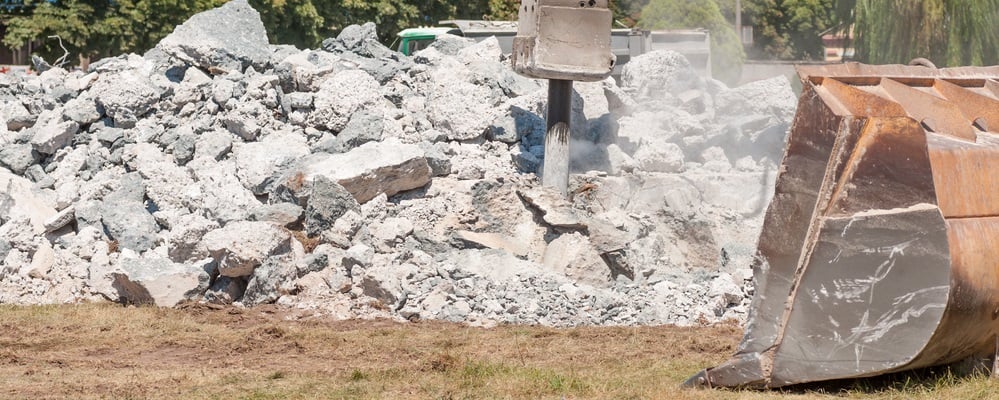
Some other common uses for the millions of tons of waste concrete produced every year in the US includes:
Landscaping Products
Coming from specialized crushing facilities, these well graded and aesthetically pleasing materials are used as substitutes for landscaping stone or aggregate.
Gabion Construction
Wire cages known as gabions, can be filled with crushed concrete and stacked together for retaining walls. They can also be used to protect embankments or other structures.
Riprap
Larger pieces of crushed concrete can be used as riprap revetments, which has become an effective and well-used method for controlling stream bank erosion.
One significant advantage of outsourcing the removal of concrete waste from your job site is the convenience. But, just as important, is the economic and environmental impact that you can have by having your concrete debris recycled and reused.
The Right Construction Waste Disposal Firm is Essential
Once you have made the decision to outsource your job site clean ups, you need to determine which firm is the right one for the job. And, while you might find plenty of guys with trucks willing to do the job “on the cheap” , going that route will end up being anything but cheap.
Junk King provides an efficient, safe and eco-friendly construction waste disposal services so you don’t need to worry about the pick up or disposal of the debris after your project is complete.
Whether you need our services several times during a construction project or just once after it is complete, our hauling professionals will ensure that the construction debris is out of your way so that you can get on with the job.
Our team specializes in construction waste removal. We can be at your site in mere minutes, so call us today! Our crew is fully insured and well-trained, so you can trust them to get rid of your debris and waste in a professional and courteous fashion.
One of the best things about hiring Junk King is that we recycle a much of the material we pick up - and not just concrete!
And this is proof of our commitment to being an eco-friendly removal service.
If you have questions about what we do or how we operate, give us a call at 1-888-888-JUNK .

